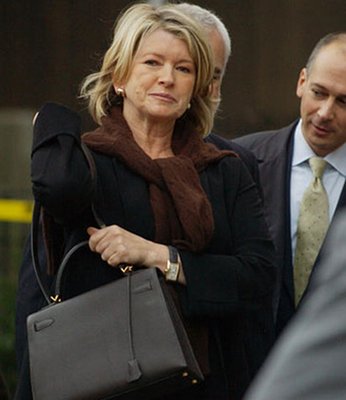Last Monday’s commentary (The Trust Deficit) talked about insider trading – the use of non-public information to trade on stocks and other securities. However, what has been illegal for most of us has been perfectly legal for officials in Congress. With the passage and signing of The Stock Act, all this ends.

Among the examples of insider trading, I cited author, and TV personality Martha Stewart. In March 2004, Stewart was found guilty on charges of lying and obstruction of justice in receiving inside information which helped her avoid losing $45,673 by selling all 3,928 shares of stock in ImClone Systems one day before the stock declined 16 percent.
That commentary resulted in a lively exchange between me and Bruce a regular reader of this site who happens to be an east coast attorney.
“…the prosecutors grossly over-reached,” Bruce writes, “and their construction of the law was rejected by the judge. This was just another celebrity prosecution. We can’t be prosecuting people just because they’re jerks.”
I argued that when confronted with the evidence, Stewart lied to federal prosecutors then told more lies to cover up the first. CNN legal analyst Jeff Toobin sat through the trial and characterized it as “a total rout. The story she told investigators after she made the stock trade simply didn’t add up.”
In spite of being found guilty on all four counts of obstruction of justice and lying to federal prosecutors, Stewart never once came forward to admit her wrongdoing while continuing to be hailed as a role model by many of her fans.
“I know the arguments,” came Bruce’s response, “but we have to be a nation of laws not prosecutors. Bottom line is the prosecution’s view of the law was rejected by the court… So really for what should Stewart have apologized? If we put nasty people in jail we’d have no room for real criminals.”
From an ethical standpoint, I believe he’s right and… he’s wrong.
No prosecutor should overstep the law. I wrote about this last month (The Round-Up) regarding prosecutorial misconduct involving Alaskan Senator Ted Stevens.
Bruce is also right in pointing out that “the prosecution’s view of the law was rejected by the court.” According to a report on CNN online, “U.S. District Judge Miriam Goldman Cedarbaum threw out the most serious charge against Stewart — securities fraud… which the judge had called ‘novel’ during the trial – [which] accused Stewart of using her own statements that she was innocent as a ploy to mislead investors in her company, Martha Stewart Living Omnimedia.”
However, this was not “just another celebrity prosecution.” Stewart’s ex-broker Peter Bacanovic was found guilty on four of the five charges against him based on testimony from his own assistant Douglas Faneuil; and ImClone founder Sam Waksal pleaded guilty to securities fraud and was sentenced to more than 7 years in prison.
In denying new trials for both Stewart and Bacanovic, Judge Cedarbaum wrote that there was “overwhelming independent evidence” to support the guilty verdicts.
In pleading for leniency from the judge before sentencing, Stewart wrote, “I ask that in judging me you consider all the good that I have done, all the contributions I have made and the intense suffering that has accompanied every single moment of the past two and a half years. I seek the opportunity to continue serving my community in a positive manner, to attempt to repair the damage that has been done and to get on with what I have always considered was a good, worthwhile and exemplary life.
“… my hopes that my life will not completely be destroyed lie entirely in your hands.”
The sad reality has always been that Martha Stewart was the only one responsible for the consequences that befell Martha Stewart, not the prosecutors, not the judge, not the jury of eight women and four men.
But here’s the real point about this case that I wish to stress: like it or not, Martha Stewart has been and continues to be viewed as a role model by millions of her fans. As such, she carries a responsibility to act in the best manner of a role model. And as such, she owes her fans a public admission that she made a dumb mistake, an error in judgment.
As someone who touts herself as being a teacher, Martha Stewart could have taught us all a great lesson in both responsibility and character. Tiger Woods publicaly admitted his indiscretions as has Kobe Bryant, Mark McGuire, Jimmy Swaggart, Alex Rodriquez, Mel Gibson, former governors Jim McGreevey, and Eliot Spitzer. While these individuals may not be characterized as pillars of integrity, each took responsibility for their actions and publicaly admitted their mistakes.
Sadly, Martha Stewart chose not to.
As to Bruce’s final point: “If we put nasty people in jail we’d have no room for real criminals.”
Does Stewart’s crime rise to the same level as Watergate or Enron; Tyco or WorldCom? Of course not; and I believe her sentence reflects that. But the reality remains, as one juror said after the trial, “No one is above the law.”
“Ethics,” Michael Josephson says, “is having the character and the courage to do the right thing, even if it costs more than you want to pay.”
Each of us will make mistakes; some small, some significant. In all cases, however, a person of character admits them, makes amends and strives to become ever mindful of future actions, because like it or not, each of us is a role model to at least one other person in our lives.
Think of the most ethical person you know. If they committed an error in judgment, how would you expect them to respond?
Comments









